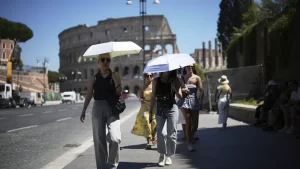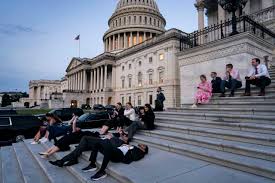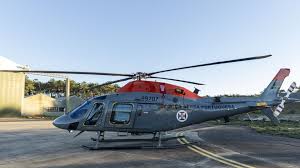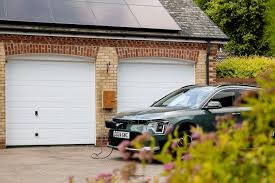Italy: PM Meloni in Kyiv amid tensions over war within her coalition
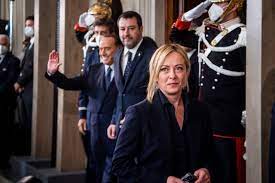
Rome: The Italian prime minister, Giorgia Meloni, has arrived in Kyiv to meet the Ukrainian president, Volodymyr Zelenskiy, and reiterate Italy’s support for the war-torn country, as she navigates tensions on the issue within her rightwing alliance and divided public opinion.
Tuesday’s trip is seen as one of the most significant made by Meloni since she came to power in October and comes a week after her coalition partner Silvio Berlusconi, the Forza Italia leader, blamed Zelenskiy for Russia’s invasion of Ukraine.
The office of Meloni, who met her Polish counterpart on Monday evening, has not released details of the trip for security reasons.
Her visit carries symbolic significance, given that it comes a day after the US president, Joe Biden, made a surprise trip to the Ukrainian capital.
“It is a really important trip for Meloni, as she needs to show her reliability to Zelenskiy, but more so to her US and European partners,” said Sofia Ventura, a politics professor at the University of Bologna. “And she needs to do this knowing that her two allies are unreliable due to their relations with Russia. The spotlight is on Kyiv because of Biden’s visit, and will linger for Meloni, so she needs to show that she can match up.”
Meloni was forced to reiterate Italy’s firm support for Ukraine last week after Berlusconi, a former prime minister who has had a long friendship with Putin, said that if he was still leading the government he would not seek a meeting with Zelenskiy, arguing that if the Ukrainian president had “stopped attacking the two autonomous republics of the Donbas” then the war would not have happened.
“I judge this gentleman very, very negatively,” Berlusconi added.
His remarks unleashed a wave of criticism, with Oleg Nikolenko, spokesperson for the Ukrainian foreign ministry, accusing him of “kissing Putin’s bloody hands”.
Berlusconi’s comments also led the European People’s party (EPP), of which Forza Italia is a member, to scrap a planned event in Naples in June.
In an interview with the Italian newspaper Corriere della Sera on Monday, Zelenskiy said he was grateful to Italy for sending weapons and had faith in Meloni’s capacity to maintain her government’s support for his country. In reference to Berlusconi’s boast last September that Putin had sent him bottles of vodka for his 86th birthday, Zelenskiy joked: “Maybe we should send him a little something … we have great quality Ukrainian vodka”.
Furthermore, Meloni has to keep in check ally Matteo Salvini, the leader of the League, who in the past heaped praise on Putin and has criticised the European sanctions against Russia.
“The fact that Meloni’s visit to Kyiv comes a day after Biden signals a government position that will make it very difficult to backtrack on,” said Lorenzo Castellani, a politics professor at Luiss University in Rome. “It also gives her stronger international visibility while putting Berlusconi and Salvini into the corner.”
Meloni is assuming a political risk with her unwavering support of Ukraine, given more than 50% of Italians are against sending weapons to the country and are sceptical of sanctions. But with her Brothers of Italy party capturing over 30% in opinion polls against less than 10% for both of her allies, she can afford to take the risk.
“She knows it’s unpopular but she is in a strong position, whereas the other two are leaders in decline,” added Castellani.
… we have a small favour to ask. Tens of millions have placed their trust in the Guardian’s fearless journalism since we started publishing 200 years ago, turning to us in moments of crisis, uncertainty, solidarity and hope. More than 1.5 million supporters, from 180 countries, now power us financially – keeping us open to all, and fiercely independent. Will you make a difference and support us too?
Unlike many others, the Guardian has no shareholders and no billionaire owner. Just the determination and passion to deliver high-impact global reporting, always free from commercial or political influence. Reporting like this is vital for democracy, for fairness and to demand better from the powerful.
And we provide all this for free, for everyone to read. We do this because we believe in information equality. Greater numbers of people can keep track of the global events shaping our world, understand their impact on people and communities, and become inspired to take meaningful action. Millions can benefit from open access to quality, truthful news, regardless of their ability to pay for it.
Whether you give a little or a lot, your funding will power our reporting for the years to come. If you can, please support us on a monthly basis from just $2. It takes less than a minute to set up, and you can rest assured that you’re making a big impact every single month in support of open, independent journalism. Thank you.

